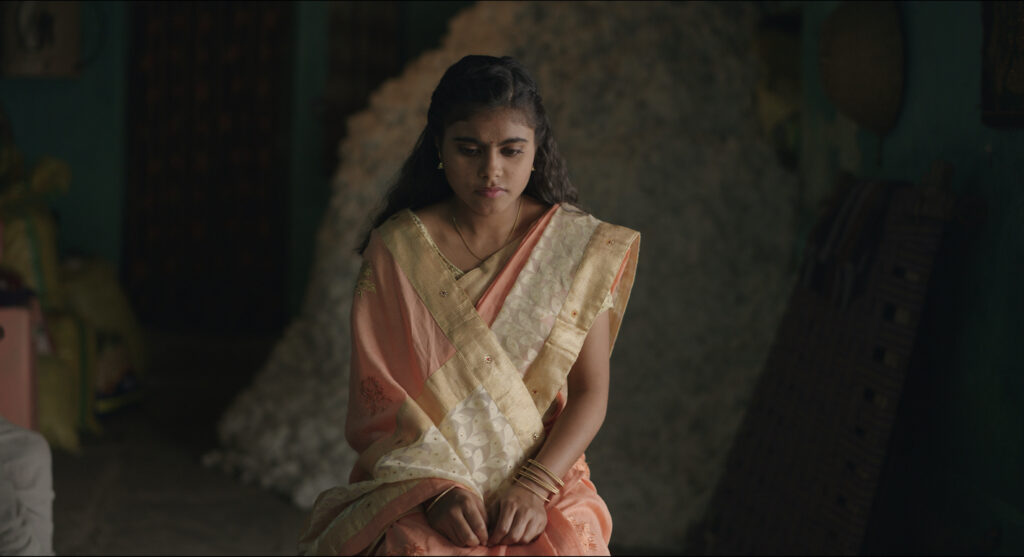Jayant Somalkar’s Marathi film, Sthal (A Match, 2023), is a powerful, biting critique on the tradition of arranged marriages in rural Maharashtra. Screened recently at the 48th edition of the Toronto International Film Festival (TIFF), 2023, the film, Somalkar’s directorial debut, won the NETPAC Award for the Best Asian Film.
Sthal begins with a group of young women, in the presence of the protagonist, Savita Daulatrao Wandhare (Nandini Chikte), questioning a male suitor and deciding if he is suitable for marriage. The scene is unusual as it challenges the notion of stereotypical, traditional gender roles and patriarchal expectations. We soon discover that such utopian occurrences can only happen in a dream. For the rest of the film, Savita constantly grapples with the limitations imposed on her by societal rules in the real world. The struggle to break free and find one’s own path, often leads to disappointment, especially if you happen to be a woman in rural India.
Savita is a final-year BA student living with her parents and elder brother in a village in the Vidarbha region of Maharashtra. She wants to complete her education and get a government job. However, her parents focus on trying to get her married off rather than allow her to pursue her career goals or live her own life. She often has to go through the humiliating drill of of being paraded in front of and having to answer inane questions posed to her by the elders of a potential male suitor. Being dark-complexioned, short in height, and most importantly, the daughter of a poor cotton farmer, she is faced with one rejection after the other. Her brother, Mangya (Suyog Dhawas), has completed his education and is unemployed. He is in love Suman (Mansi Pawar) but cannot marry her unless Savita gets married first. One prospective suitor brings a glimmer of hope for the family. But his father demands a huge dowry. Savita’s father, Daulatrao Wandhare (Taranath Khiratkar), decides to leave no stone unturned to arrange the dowry to ensure that Savita gets married but fate has other plans for him and his daughter…
Sthal, shot on actual locations with local, non-professional actors, effectively demonstrates how gender bias, patriarchy, social inequality and economic backwardness are all intertwined with one another. The realistic treatment with a fine eye for smaller details blends in without ever being didactic and allows the audience to reflect and draw their own conclusions. Every time there is a possible suitor for her, Savita has to face the army of elders and answer the same questions again and again, thereby exposing the pointlessness of the entire process. In a pivotal scene, Savita has to sacrifice sitting for her MPSC exam and lose an academic year because the brother-in-law of the proposed match will not be available later to formulate his judgment. In another, at a community wedding programme, Savita has to repeat the same thing – this time on a stage in front of a totally disinterested crowd. These scenes not only emphatically highlight the absurdity and unfairness of the entire arranged-marriage system but also emphasize the helplessness of those who are trapped within it.
Despite the bleakness in the tale, Somalkar successfully brings a measured dose of humor into the storytelling as well. A warm moment of togetherness between a young couple in a cotton field is thought to be an encroachment from a wild boar. In another sequence, as people sit for a marriage feast, the electricity suddenly goes off. Only for the car’s headlights to illuminate the location! Deft touches like these lift the film a notch or two. That said, there are bits where the film goes around in circles, reiterating its concerns perhaps once too often. Thankfully, Somalkar brings it back on track with the hard-hitting ending that delivers as powerful a punch as any.
The actors, from the village itself, embody their characters with genuine body languages and real emotions. Nandini Chikte gives a quiet inner strength to Savita, that has our empathy and admiration. It is heart-breaking for us to witness her cruel rejection and the breaking down of her dreams each time. Taranath Khiratkar, who plays Savita’s powerless father, Daularao, captures the pathos and poignancy of his character perfectly. The performances from the secondary cast are spot-on as they enact their roles with much honesty and believability.
The cinematography by Manoj Karmakar is largely simple and straightforward, complementing the look and feel of the film. The editing by Abhijit Deshpande could have done with some judicious trimming in the bits where the film starts becoming repetitive. The production design by Vikram Singh and the costumes by Anuttama Nayakavdi add a layer of verisimilitude, bringing a further layer of authenticity to the film. The sound design by Sanjay Chaturvedi is apt, ensuring that even silences speak louder than words.
Sthal is a fine first film for Somalkar and marks him out as a filmmaker of immense promise. It would be interesting to see where he goes next with his subsequent films.
Marathi, Drama, Color


